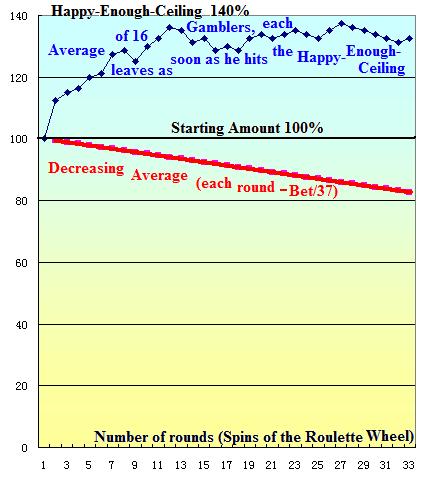Is this really how it works, Sock? As STRAW-MAN said the last time: “ … that sounds somehow very wrong. If you lose 1/37 of your bet on average and bet 200 dollars, then you should be down by only 200 dollars after 37 times.” In the reality of casino gambling, you usually walk out having lost all your money, and often the zero may not even have come up once.
STRAW-MAN: Yes, because people are not so clever!
SOCK-PUPPET: The casino only shifts the money from red to black or black to red. How does the stupidity of the gamblers matter?
STRAW-MAN: Well, 1/37 is the minimum that the casino earns anyway on average every spin. However, casinos earn much more than that because of what we discussed about the random walk between the limits: “Gambling means to go on a ride, a random walk of your amount of money, your “bankroll”, away from what you started with. If betting small amounts, the random walk is likely to stay close to the expected average. You can likely gamble for a long time, but the expected average slowly decreases, at a French type roulette table 1/37 of your average bet with every spin of the wheel. … The most important is to have your Happy-Enough-Ceiling, where if you reach it, you leave with your winnings … It must be closer to the amount that you bring to the table than the amount you bring to the table. Why? The casino’s strict limit is all the money you bring to the table. Your random walk will hit most likely first whatever limit is closer to where the random walk started. If the casino’s limit is closer than yours, you usually lose. The casino’s limit is the money you bring to the table.”
So, where is the stupidity?
STRAW-MAN: The stupid gamblers do not have your Happy-Enough-Ceiling. Or their ceiling is too high. The random walk will first hit the limit that is nearer to where they started, which is usually the limit of that the gambler runs out of money. As you said, “Therefore, you must walk away at some point well below having doubled your money.”
So, that is how the casinos make the big money? Their own automatic Happy-Enough-Ceiling, namely the gambler having lost all their money, cuts the random walk short.
STRAW-MAN: Yes. And they do not want you to know that it is this simple! If you are clever, you turn the table on the casino and use their own strategy against them. That is what your Happy-Enough-Ceiling is really about. Instead of the casino cutting the random walk short, taking all your money, you cut it short earlier and take theirs. Look, here is a plot of a quite common outcome of a simulated run with your strategy of betting 20% of the starting amount and leaving if your bankroll reaches 140%, which is after two bets already if you are lucky. See the blue data? Those points are the average of the bankrolls of 16 smart gamblers at the table, all playing your strategy.

Wow – the gamblers make some serious money. Did you book the tickets to Las Vegas yet?
STRAW-MAN: Las Vegas? We are going to Macao! In the private VIP rooms, the triads can secretly triple all bets – we are going to take their money, too!
Marvelous. I am all in. I am going to try sell this method and let the gamblers who turn lucky with it give me some of their earnings.
SOCK-PUPPET: Eh – I see – I am in, too!
STRAW-MAN: You guys are not going to gamble with the system? Just try to sell it? Why?
Well, I think we should leave this as a new ‘didactic challenge’, like here and here and the perfect physics instructors' suicide here. As always, you can either toss around equations and suchlike, all not really convincing anybody, or, and this is what the word "didactic" is all about, you sit back and think and give us one to three medium length sentences that make the reader go “Ohhhh – but of f’n course!”. The sentences may start like this: Since STRAW-MAN is going to gamble alone, let us not have 16 gamblers, but instead he gambles anew every day for 16 days.
STRAW-MAN: That is the same; there is no difference, mister pretend to know all about many-worlds/minds theories!
Mathematically, physically, logically, yes, but psychologically, and therefore, thinking-wise, didactically, no!




Comments